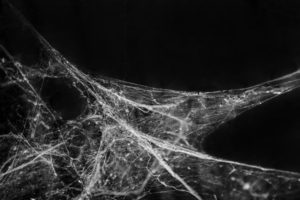I dreamed I saw a broken cobweb hanging on my living room wall. My Book Club friends pretended not to see it. From across the room, I felt obsessed with the need to wipe away its dusty, sticky threads. But I stood transfixed, rooted to the spot, by… I don’t know. Shame? Morbid fascination? Fear?
The image of the ragged cobweb haunted me — this scrap of former industry clinging to… what? A blank wall, like an impromptu canvas depicting a very natural process. The image as a dedication to transformation — of life into death in the service of life – now useless, dirty, and abandoned. Its creator dead, perhaps? We don’t know. Her forsaken web is now a dingy homespun reminder that Death will come. On her own schedule. Looked for but not welcome. Not usually. Except maybe, secretly, by those who stand watch, afraid to hope for something so terrible. When witnessing the process of dying is painful. Or has gone on for a very long time. Death is not something polite people talk about. Even when its looming presence is plain for all to see. Unless, of course, it’s a work of art. Or for fun, like in a horror movie. Or, as a Halloween costume, or a spooky decoration.
My dear friend is dying. Consciously dying. Which means that she is not pretending it is not happening to her. She is doing her best to die with grace, dignity and with an acute awareness of the process as it happens. Aware of constant, unbearable pain, and loss, as her body’s functions are shutting down. I am trying to be consciously present with her as she goes through this process. I haven’t had much experience with death, or with people who are dying, before now. When I’m with her I try to be respectfully curious – if she wants to talk about it. I worry that it may be ghoulish of me to be too curious about what it’s like to be dying. So other times, I talk about what’s fun, new, exciting in my life, an article in the latest New Yorker, or something mundane but necessary, like would she like me to cut her grilled cheese sandwich into two pieces? Or four? Can I help her to the bathroom? And then I wonder if I’m being patronizing. Or, self-involved. Too rooted in life; not mindful enough of her deeper needs. The gravity of what death will mean. Avoiding the fact that she will be dead and I will continue doing what in the words of poet Marie Howe calls, “what the living do.”
not happening to her. She is doing her best to die with grace, dignity and with an acute awareness of the process as it happens. Aware of constant, unbearable pain, and loss, as her body’s functions are shutting down. I am trying to be consciously present with her as she goes through this process. I haven’t had much experience with death, or with people who are dying, before now. When I’m with her I try to be respectfully curious – if she wants to talk about it. I worry that it may be ghoulish of me to be too curious about what it’s like to be dying. So other times, I talk about what’s fun, new, exciting in my life, an article in the latest New Yorker, or something mundane but necessary, like would she like me to cut her grilled cheese sandwich into two pieces? Or four? Can I help her to the bathroom? And then I wonder if I’m being patronizing. Or, self-involved. Too rooted in life; not mindful enough of her deeper needs. The gravity of what death will mean. Avoiding the fact that she will be dead and I will continue doing what in the words of poet Marie Howe calls, “what the living do.”
My friend talks about the process of dying as involving the cutting of threads that attach us emotionally to our bodies, our life, our loves, our passions, our pain. Consciously dying requires a radical awareness and an authentic acceptance of letting go of one’s attachments to life. The expectation is to make the transition into death less jarring; not feared but familiar, even welcomed. The threads around the heart are particularly difficult to cut, she says, and we sit quietly reflecting on this for a few moments. I am curious about the sturdy threads that once attached my dream cobweb to the wall, half of them now ripped away; their remnants covered with dust and grime. I reflect on my attachment to her, on all she’s meant to me over the years. The evolution of our relationship from mentor-mentee, to colleagues to soul sisters.
How do I give that up?
 Later, I imagine snipping the threads around my own heart attaching her to me so it will be easier for me to let her go; When it’s time. I agonize over if, in so doing before her actual death, I am prematurely severing my deep and sincere love for her as a living, breathing person? I worry that she’ll feel the absence of my connecting threads and interpret it as a betrayal instead of my intention which is for her to be freed up to depart on her body and soul’s own time. My concern for my personal feelings seems selfish. Like I’m giving up on her to protect myself from the pain of losing her. What a paradox: to let go and stay connected at the same time. Holding that tension of opposites. Not an easy thing to do.
Later, I imagine snipping the threads around my own heart attaching her to me so it will be easier for me to let her go; When it’s time. I agonize over if, in so doing before her actual death, I am prematurely severing my deep and sincere love for her as a living, breathing person? I worry that she’ll feel the absence of my connecting threads and interpret it as a betrayal instead of my intention which is for her to be freed up to depart on her body and soul’s own time. My concern for my personal feelings seems selfish. Like I’m giving up on her to protect myself from the pain of losing her. What a paradox: to let go and stay connected at the same time. Holding that tension of opposites. Not an easy thing to do.
And then I remember a wise person telling me that attachment is not the same thing as connection. Attachment means, “Don’t go away! Don’t leave me!” A connected heart means, “I will always love you.” Love permeates all realms. It radiates outward and inwards, folding us in an embrace of angel wings. My heart can be connected to her here in this living world and stay connected to her when she passes beyond the veil into death. Perhaps, we hope, this pervasive quality of love will allow us to both support our dying loved one and let go of her at the same time. Both. But we don’t know; we hope and we trust. And, by trusting that both are possible, we increase our capacity for sitting with the mystery of life and its requisite experience of death. The human condition.
Remembrance of this insight gives me enormous relief. We can be connected and let go at the same time. There is such healing in trusting the mystery of paradox.
Consciously being with someone who is dying is as much about being cognizant of the boundaries between us as of the love that connects us in this temporal world. I cannot imagine what my friend is going through. Her levels of pain. Where she goes when she  slips across the veil to dance with shadows and angels, as if trying out her new home. This is a boundary I cannot cross. But maybe that’s the point. I cannot live her life or die her death with her. We each must travel that road alone. We all will leave this earth and leave our living loved ones behind. Time transforms us. The sticky threads of attachment will loosen their needy grip in the course of time. And we can work to consciously snip them apart. What remains will be the pure essence of our love for each other. That is real. Such that, whenever we wish, our heart may call forth the memories of our time together; bringing us comfort and laughter, and the poignancy of loss. Love permeates the boundaries between worlds. Love flows effortlessly back and forth through time; What is eternal suffuses all time. This is what the living do. What we hold on to. Our love. Our memories. And then, consciously, lovingly, we are free to sweep away our possessive, needy attachment to a life that is no longer viable; Cherishing for the remainder of our own life, that beloved essence which is eternal.
slips across the veil to dance with shadows and angels, as if trying out her new home. This is a boundary I cannot cross. But maybe that’s the point. I cannot live her life or die her death with her. We each must travel that road alone. We all will leave this earth and leave our living loved ones behind. Time transforms us. The sticky threads of attachment will loosen their needy grip in the course of time. And we can work to consciously snip them apart. What remains will be the pure essence of our love for each other. That is real. Such that, whenever we wish, our heart may call forth the memories of our time together; bringing us comfort and laughter, and the poignancy of loss. Love permeates the boundaries between worlds. Love flows effortlessly back and forth through time; What is eternal suffuses all time. This is what the living do. What we hold on to. Our love. Our memories. And then, consciously, lovingly, we are free to sweep away our possessive, needy attachment to a life that is no longer viable; Cherishing for the remainder of our own life, that beloved essence which is eternal.
 To live in this world
To live in this world
you must be able
to do three things:
To love what is mortal;
to hold it against your bones
knowing your own life depends on it;
and, when the time comes to let it go,
to let it go.
–Mary Oliver, excerpt “In Blackwater Woods”
from Mary Oliver New and Selected Poems
 (626) 755-6437
(626) 755-6437



